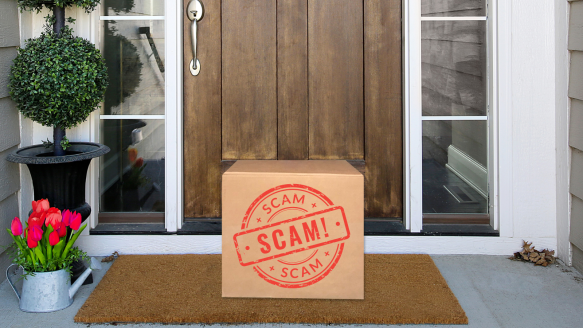Have you received a surprise package at your doorstep recently? Packages from an unknown sender, especially those including a QR code – are likely part of a dangerous new brushing scam. With new scam tactics evolving constantly, knowing what to look out for and how to respond is important. At First Financial, we’re here to help you recognize these schemes and protect your personal and financial information.
What is a Brushing Scam?
A brushing scam is when someone receives packages they didn’t order, often low-cost or counterfeit items like beauty products or small electronics, from a seller trying to boost their online reputation. The scammer uses the recipient’s personal information (often obtained through data leaks) to create fake customer reviews, falsely increasing the legitimacy of their product listings. While the merchandise may seem harmless, the real concern is that your personal information – name, address, or even online account details, have likely been compromised.
The New Twist: QR Code Scams in Packages
Scammers are now also including QR codes in these unexpected packages. The note may say the QR code will reveal who sent the gift, provide return instructions, or offer a bonus or prize. But in reality, scanning the code could redirect you to a phishing website designed to steal sensitive information like your login credentials or credit card number. Even worse, it may install malware on your device, giving hackers access to your data and apps.
How to Protect Yourself from QR Code and Package Scams
Don’t Scan Unfamiliar QR Codes: If you receive a package you didn’t order, avoid scanning any QR codes inside. These can be designed to mimic legitimate company branding and lead to fake websites that steal personal data.
Check Your Online Shopping Accounts: If the package came from a known platform like Amazon or eBay, login to your account and look for any unauthorized orders. If you see suspicious activity, change your password immediately and report the fraud to the platform.
Change Your Passwords: It’s a good idea to update your passwords on shopping accounts and your email if you received a suspicious package. Always use strong, unique passwords and consider enabling two-factor authentication for extra security.
Don’t Contact the “Sender”: Don’t attempt to reach out, even if a name, phone number, or website is included in the package. Scammers may use this opportunity to trick you into providing more personal details under the guise of resolving the issue.
Monitor Your Credit and Accounts: Visit AnnualCreditReport.com to review your credit report and look for any unfamiliar accounts or inquiries. Also, check your bank and credit card statements for unauthorized transactions.
Consider Freezing Your Credit or Adding a Fraud Alert: If you believe your personal information may be at risk, take additional steps like placing a fraud alert on your credit report or freezing your credit to prevent new accounts from being opened in your name.
Keep Devices Secure and Updated: Ensure your phone and computer software are continuously updated with the latest security patches. A secure device is your first line of defense against malware and phishing attempts.
Use Trusted QR Scanner Apps: If you must scan a QR code, use a QR code scanner app that shows you the destination URL before redirecting you. This provides a chance to spot suspicious links before it’s too late.
What to Do if You Think You’ve Been Scammed
If you received an unsolicited package, scanned a QR code, or noticed suspicious activity on your accounts:
- Change your passwords immediately – Update and strengthen passwords for your financial and email accounts right away.
- Contact your financial institution – Report the incident and monitor for any unauthorized transactions.
- Monitor your credit – Visit AnnualCreditReport.com to review your credit report and closely check for suspicious inquiries or accounts.
- File a report with the FTC at ReportFraud.ftc.gov and, if necessary, start a recovery plan at IdentityTheft.gov.
Stay Safe with First Financial
We’re dedicated to helping our members stay informed and protected from scams. If you ever suspect fraud or have concerns about any of your accounts, call us at 732.312.1500 or visit one of our local branches.




